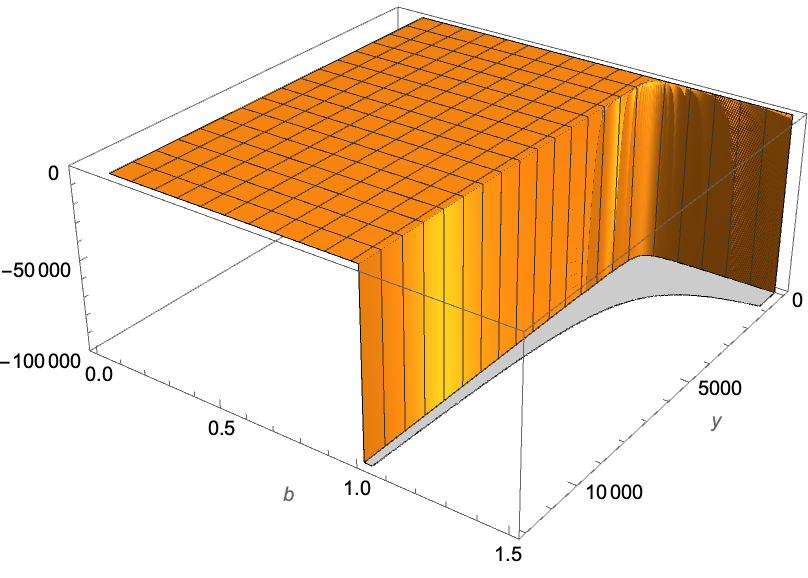The integral appears to be solvable in Mathematica 8.0.1 when substituting a and b with b=Prime[3] and a=Prime[5] and applying integration by parts 3 times:
Part1 = (1 - y*E^(Prime[3]*y)*Gamma[0, y/Prime[3]]);
Part2 = 1/(1 + Prime[5]*y);
u = Part1;
du = D[Part1, y];
v = Integrate[Part2, y];
dv = Part2;
u*v - Integrate[v*du, y]
Integrate[Part1*Part2, y];
which gives:
(1/11)*Log[11*y + 1]*(1 - E^(5*y)*y*Gamma[0, y/5]) -
(1/11)*Integrate[Log[11*y + 1]*(E^((24*y)/5) -
E^(5*y)*Gamma[0, y/5] - 5*E^(5*y)*y*Gamma[0, y/5]), y]
Integration by parts of the unsolved expression within the integral:
Part2 = (E^(24 y/5) - E^(5 y) Gamma[0, y/5] -
5 E^(5 y) y Gamma[0, y/5]) ;
Part1 = Log[1 + 11 y];
u = Part1;
du = D[Part1, y];
v = Integrate[Part2, y];
dv = Part2;
u*v - Integrate[v*du, y]
gives:
11*Integrate[(E^(5*y)*y*Gamma[0, y/5])/(1 + 11*y), y] -
E^(5*y)*y*Gamma[0, y/5]*Log[1 + 11*y]
Integrating by parts of the unsolved expression a last time:
Part2 = E^(5 y) y Gamma[0, y/5];
Part1 = 1 + 11 y;
u = Part1;
du = D[Part1, y];
v = Integrate[Part2, y];
dv = Part2;
u*v - Integrate[v*du, y]
gives:
(-(11/600))*((365/24)*E^((24*y)/5) - (48/5)*ExpIntegralEi[(24*y)/5] -
24*y*ExpIntegralEi[(24*y)/5] + (24/5)*E^(5*y)*(-2 + 5*y)*
Gamma[0, y/5]) +
(1 + 11*y)*((1/24)*E^((24*y)/5) - (1/25)*ExpIntegralEi[(24*y)/5] +
(1/25)*E^(5*y)*(-1 + 5*y)*Gamma[0, y/5])
which has no unsolved integral expressions in it, so therefore it is possible that your integral is solvable, but you need to refine this answer by including not only the unsolved expressions and also try different values of a and b to make it exact. Also since Mathematica 8 is an old version, newer versions might give different answers. That because of previous programming bugs in integration in Mathematica 8.


aandband make the integral indefinite or substitutem = Infinity). You can't solve it. Most integrals simply can't be expressed in terms of familiar functions, so this is not at all surprising. IMO any such question without an argument for why one should expect Mathematica to be able to solve a known-to-be-hard problem should be off-topic here. $\endgroup$